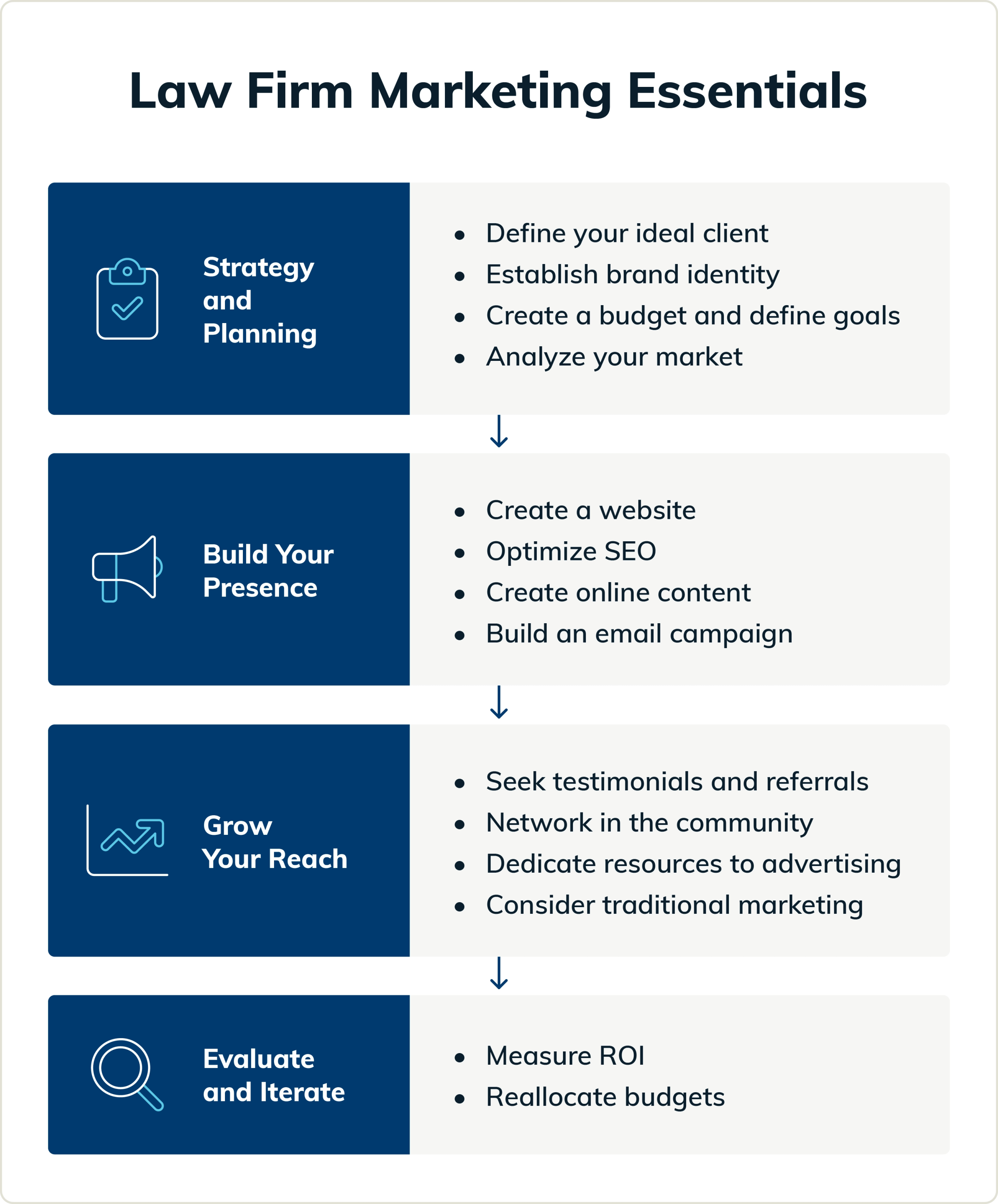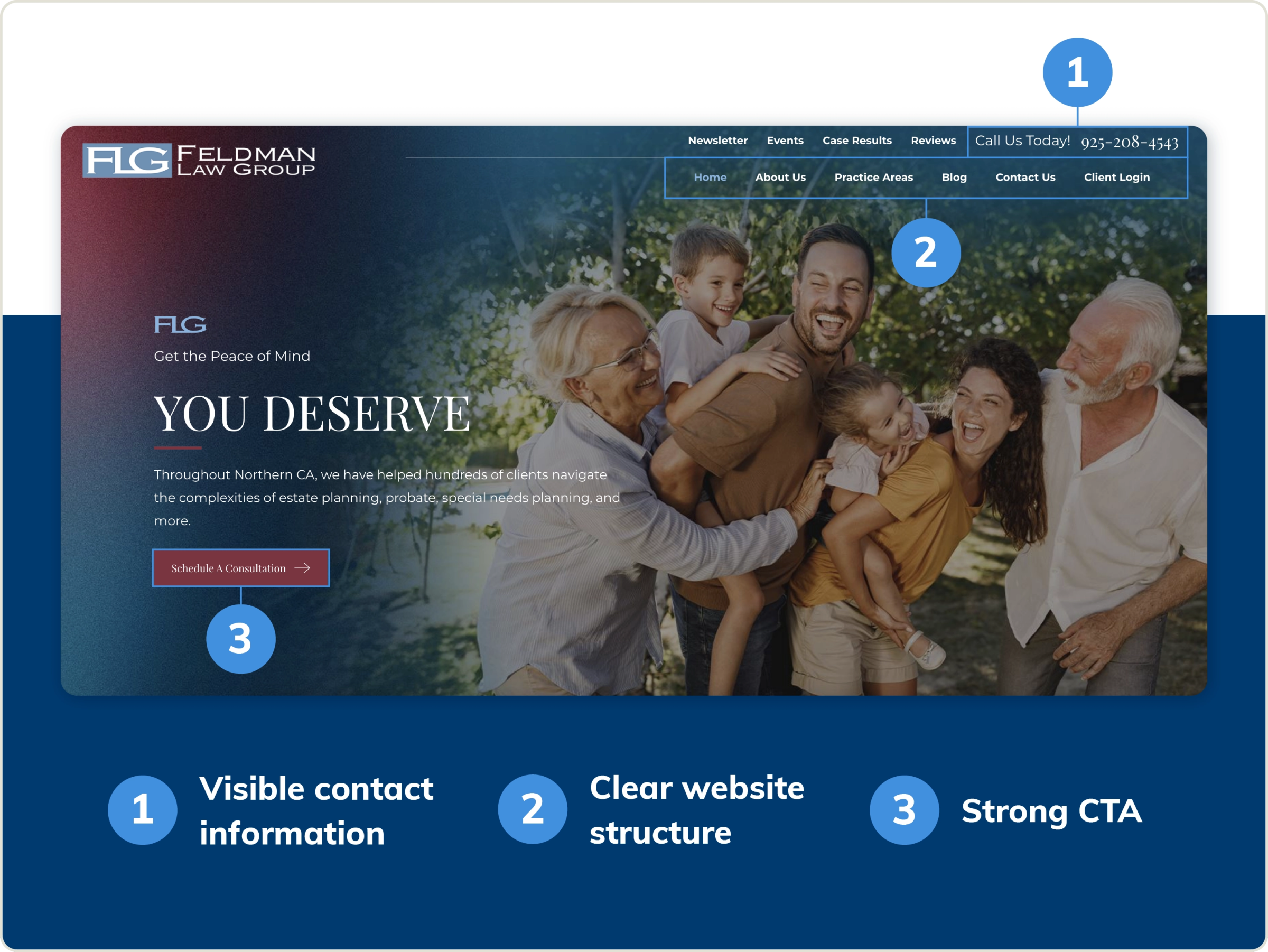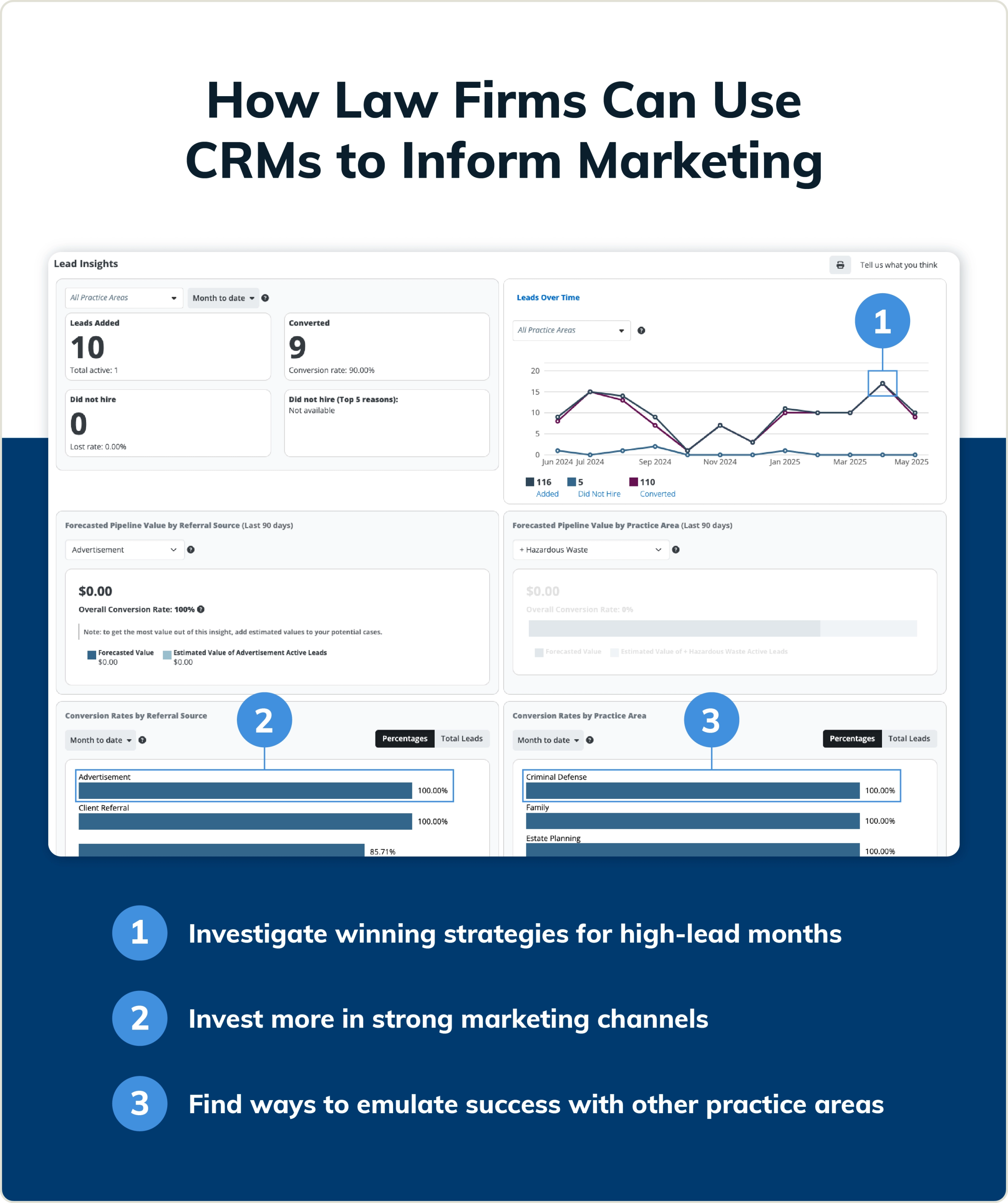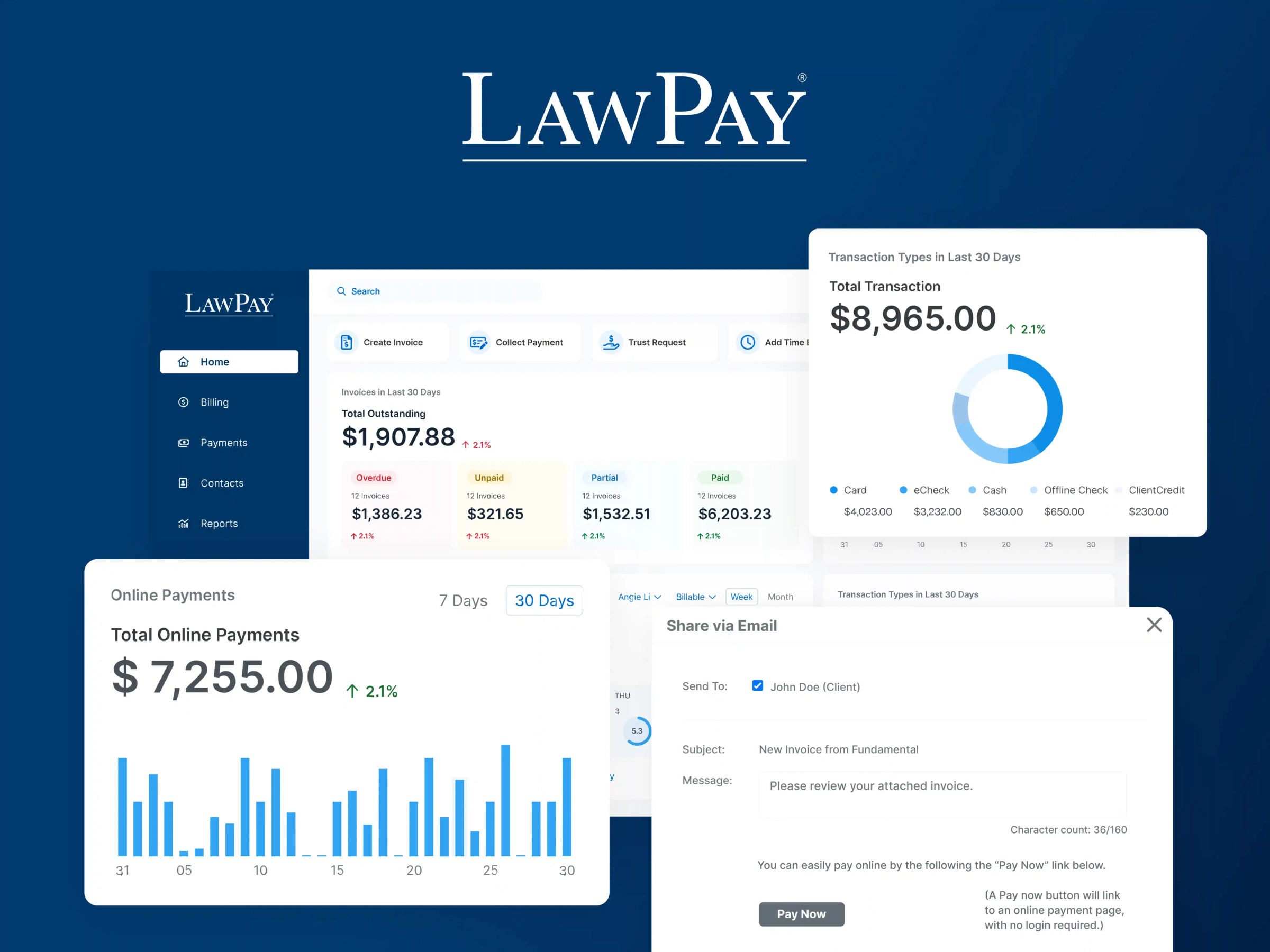Key takeaways
Law firm marketing is the process law firms use to grow awareness of their services through digital or traditional methods.
Effective law firm marketing strategies include building a website, leveraging SEO, networking with the local community, and encouraging referrals and reviews.
You can track and measure the success of your marketing efforts using 8am™ MyCase’s CRM solutions. It highlights important metrics to help you adjust your campaigns as needed
For law firms, marketing isn’t just about increasing visibility. It’s about building credibility and trust so prospective clients feel confident choosing your services over competitors.
While you can use high-priced agencies and consultants to promote your law firm, that’s not the only way to succeed. Many firms, including small firms and solo practitioners, can thrive with cost-efficient, in-house law firm marketing programs.
Marketing generates brand awareness. Your messages may reach prospective clients just when they need legal representation, but a good, memorable marketing effort can also plant seeds for future business.
Whether your firm outsources these activities or handles them in-house, consider this guide your ultimate resource. Learn what law firm marketing is, how it benefits the firm, key marketing terms to know, law firm marketing tips, and strategies to manage marketing efficiently.
What is law firm marketing?
Law firm marketing refers to the strategies and tactics used by firms to grow public awareness of their services, promote the firm, and win new business.
Your marketing efforts may include modern digital methods, like:
Building and maintaining a website (ideally with a focus on SEO)
Sending emails to prospective and existing clients
Social media marketing
Content marketing
Managing online reviews
On the other hand, more traditional methods include purchasing offline advertising like print ads, signage, or TV or radio spots. You may also try in-person networking and seeking referrals.
Why is it important?
Law firm marketing helps firms attract new clients, reach new audiences, and build trust and credibility—all crucial in a competitive legal market.
Executing a clear marketing strategy increases the chances of the right clients finding you at the right time. Plus, it positions your firm as an authority in your practice area(s) and supports your long-term growth by generating a steady funnel of leads.
How does law firm marketing work?
Effective law firm marketing uses various channels to promote your firm, your area of focus, and your unique value proposition. The high-level goal of attorney marketing is to build a flow of prospective clients, also known as a new business pipeline. A healthy pipeline can help establish more predictable, consistent cash flow that helps your firm efficiently allocate resources. For example, you may be able to hire more staff and take on more clients if you can reasonably predict your cash flow and cases each month.
To start off your marketing strategy, you’ll want to build brand recognition. Leverage social media, online ads, radio spots, and printed banners or flyers to communicate your firm’s level of service and expertise. When those messages consistently present a compelling brand, prospects are more likely to remember your firm. That way, you’ll come to mind next time they need a lawyer.
Next, focus on pushing leads (or prospective clients) down your sales funnel. Prospects only convert into paying customers when they believe the firm can successfully address their issue, so pay special attention to the AIDA model:
Awareness
Interest
Desire
Action
Many firms try to generate leads through several channels, like referrals or paid ads, then keep them interested via ongoing contact.
How can lawyers get started with marketing?
While you may not have the resources to execute a far-reaching strategy right away, there are a few core components:
Developing compelling language to communicate your unique selling position
Establishing at least one social media channel
Creating an online content plan that includes educational and promotional information
Building a website that communicates your firm’s value, supports custom landing pages, and collects leads
Initiating a customer relationship management (CRM) system to track prospects

1. Define your ideal client
The first step to a successful law firm marketing plan is understanding who you want to market to. Do this by:
Getting clear on the specific type of business or individual your firm best serves
Thinking about who is most likely to have challenges or objectives that your firm’s expertise can address
Considering how your firm will address those needs
For example, a family law attorney might define their ideal client as higher-income, middle-aged parents divorcing and seeking guidance on custody and splitting assets. With this knowledge, the attorney can:
Draft content addressing common questions and concerns
Advertise on platforms where parents, millennials, or Gen X are active
Offer specific resources like a blog post on “Co-Parenting Tips for Divorced Parents”
2. Establish your firm’s brand identity
Once you’re clear on who you hope to reach, determine how to best reach and attract them. Ask yourself how you want your ideal client to perceive your practice. Clarify your focus areas, what sets your firm apart, and how you can use a visual and written style to reflect those differentiators.
Then, make sure all marketing materials, from your website to your social media posts and beyond, share a consistent message to build recognition.
A personal injury attorney, for instance, might choose to position their firm as approachable and client-focused. They could use a warm color scheme and empathetic language to emphasize their compassionate service and strong case outcomes.
3. Create a marketing budget and define goals
Next, you’ll create a law firm marketing budget that aligns with your firm’s financial resources while getting results. Start by defining your marketing goals—such as increasing leads by 20% or generating 10 new consultations each month—then earmark funds for the costs to reach those goals.
For instance, you might budget for:
Software costs, many of which are prescription-based
Non-billable hours spent on marketing, which you can calculate by tracking the average amount of time spent on marketing work
One-time costs, such as paying a graphic designer to design a logo or a web designer to build your website
To keep costs reasonable, invest in law firm marketing automation tools like a CRM to track leads or a writing assistant to create content. As an example of how tools support AI marketing for law firms, imagine an estate planning firm that wants to double its consultations.
They might budget for a CRM with AI capabilities to manage leads and an AI assistant to draft blog posts and answer prospects’ questions.
4. Analyze your market and competitors
Successful marketing requires knowing where your firm stands out and how it compares to others by analyzing the market and your competitors. You can do this by:
Researching the needs of your target audience
Determining what legal services are in demand
Looking at how other local firms position themselves
Assessing their websites, content, reviews, and pricing to see if there are gaps or opportunities your firm can leverage
For instance, a criminal defense attorney might notice that similar firms in their city focus mostly on DUI cases but offer limited online resources. They realize there is an unmet need for information around white-collar defense, so they start creating blog posts and social media updates to position their firm as the authority.
5. Create a website
For law firm web marketing to be effective, you need a strong website. At the very least, consider creating a landing page, which is a website page optimized to generate or convert leads. Law firms can leverage landing pages to receive and convert SEO traffic or as the destination for clicks on PPC ads.
When building a website, make sure your site or landing page has a strong call to action (CTA), which is a phrase directing readers to engage. Think: "buy now," "download the free report," or "contact us." Online, CTAs are often displayed on boldly designed buttons to stand out. If there is more than one CTA, the options should be prioritized visually through design.
For example, a law firm might prefer website visitors to set an appointment immediately. But if they're not ready for an appointment, the landing page could also offer a free download of an educational guide as a lower-commitment action that engages them with the firm. The "set an appointment now" CTA would be visually more prominent on the page than the "download now" CTA.
Generally, a website is a great supplement to the rest of your marketing efforts, especially organic marketing (strategies that gain exposure without paid advertising).

6. Optimize the website for SEO
Search engine optimization (SEO) is the practice of improving a website so it appears more often in search results. It’s a core component of organic marketing for lawyers as it delivers a large audience at a relatively low cost.
Local SEO is especially critical, as it helps your firm appear in “near me” searches. Increase success by optimizing your Google Business profile, adding location-specific keywords, and encouraging reviews from local clients.
As an example of law firm SEO marketing, think about how a family law attorney in Seattle would benefit from showing up when people search Google for "divorce attorneys near me" or similar keyword phrases.
To achieve this, they might claim and set up a Google Business profile with accurate contact information and recent reviews. They could also create unique service pages targeting content like “Seattle family law” or “divorce lawyer in Seattle.”
7. Create online content for your website and social media
Law firm digital marketing involves developing a strong online presence, ideally via both your website and social media. This type of marketing will position your firm as an authority and build credibility.
Ultimately, your goal is to provide useful information to the public via blog posts, social media content, videos, or longer-form content like ebooks.
Law firm social media marketing can be organic or paid, depending on the activity:
Organic social media efforts: These are unpaid, often community-driven interactions. Examples include posting updates, engaging with your followers, and building community over time.
Paid social media efforts: These are advertising campaigns where businesses buy ads on social media platforms to get in front of larger or more targeted audiences. Examples include LinkedIn, Facebook, or Instagram ads.
Prioritize channels that maximize your ROI—especially if you need to adhere to a low budget—and those where your target client is most active, like LinkedIn for professionals.
Your website can act as a central hub that holds all pertinent information and links out to social profiles or other spaces. It’s also a great place to focus on law firm content marketing by hosting and regularly updating a blog.
Social media posts can amplify that content, and you can leverage law firm video marketing to offer educational content in a more personable way.
A few other content ideas:
Educational written content
Webinars or educational video series
Case studies or downloadable ebooks
Social media posts sharing client testimonials
Blog posts on relevant legal topics
Also, you can repurpose existing long-form content—like pieces of old blog posts or case studies—and break them into several social media posts or video snippets. This lets you reach new prospects without a lot of extra effort.
For example, an estate planning firm may publish a detailed blog post about protecting assets in a will. They can then repurpose it into a series of Instagram or LinkedIn carousel posts, a short video explainer, and a downloadable guide or checklist.
8. Seek testimonials and referrals from clients
Positive testimonials and referrals from satisfied clients build credibility and can establish trust with prospective clients. Often, reviews can be a deciding factor for those choosing between law firms.
Request feedback from clients directly after a case successfully wraps, provide links to your Google Business profile, or encourage them to review your firm on sites like Avvo, FindLaw, or Yelp.
The same goes for referrals. After a case closes, share that you welcome referrals and introductions to people in your client’s network if they feel you provided a referral-worthy experience. Because people tend to trust those they know, you’ll already be off on the right foot, which makes referrals an ideal way for lawyers to get clients.

9. Network and connect with the local community
Making local connections is a key—but often forgotten—aspect of law firm marketing and business development. This helps you meet more people and build credibility with them.
The more you network with local clientele (accountants, real estate agents, healthcare providers, or simply families), the more opportunities you have to grow your firm’s referrals.
There are plenty of local marketing options. Sponsoring soccer tournaments or 5k runs, for example, puts your firm's messaging directly in front of the local population via banners, logos, or announcements from the master of ceremonies. Attending community events or speaking at workshops lets you get your name out and show your expertise.
For example, a real estate attorney might attend local real estate networking events, join chamber of commerce meetings, or offer free or low-cost seminars on real estate law.
Connections you build throughout this process can lead to referrals, possible collaboration opportunities, such as serving as a brokerage’s go-to attorney, and an increased local profile.
10. Build an email campaign
As prospects learn about your firm, add them to a database or CRM and send out regular email campaigns. Law firm email marketing keeps you in touch with your ideal clients and puts you at the front of their minds.
Provide value by sharing educational content, informative updates, or helpful resources. It’s also beneficial to include a call-to-action, like downloading a guide or scheduling a consultation.
You can also send campaigns to current clients, but to ensure your messages are relevant, segment your audience into prospects and current clients.
For example, a personal injury attorney might send a monthly email with updates on local traffic laws or conditions, tips for handling accident claims, or success stories from recent cases. They may send a different email to current clients, sharing relevant firm updates as well as the same tips and updates as the prospect email.
11. Dedicate resources to advertising
Advertising is a way to help you reach potential clients that may not find you organically. Common law firm advertising ideas include online ads, pay-per-click (PPC), and paid marketing campaigns.
Online ads are any type of advertising conducted online, such as Google ads or social media ads.
PPC is a type of paid online advertising often used to appear in search engine results for specific queries, so people click on the ad and visit the advertiser's website. Advertisers pay for each ad click.
Paid marketing encompasses any campaign that charges a fee in exchange for exposure to an audience. PPC is in the paid marketing bucket, as is sponsoring email newsletters and buying radio spots.
When allocating resources to advertising, it’s important to maximize your law firm marketing ROI. Some ways to achieve this are carefully targeting your ads to your ideal client and staying on top of how the ads perform so you can adjust as needed.
For instance, a real estate attorney might run Google ads targeting keywords like “real estate attorney near me” in their city, or use Facebook ads aimed at local real estate professionals. Through tracking which ads bring in the most inquiries and adjusting spending accordingly, the attorney can feel confident that the ad budget is working effectively.
12. Consider the benefits of traditional marketing
Don’t forget about more traditional marketing methods when considering law firm marketing ideas. Many offline channels can work well alongside your digital marketing efforts to bolster brand awareness, reach audiences offline, and establish credibility through better visibility.
Examples of traditional marketing include TV ads, billboards, media interviews, and radio ads. Some of these more traditional methods, however, can be costly. They’re also less targeted and usually harder to track and measure, so it’s helpful to weigh those factors before implementing them.
13. Measure marketing ROI and iterate
Law firm marketers build their initial campaigns from assumptions about what motivates their ideal client. The campaign outcomes then prove those assumptions right or wrong, but tracking the data can also provide an earlier idea of law firm marketing ROI.
When you track the performance of your marketing efforts through established law firm KPIs, you can see what’s driving inquiries and conversions and adjust your strategy accordingly.
With solutions like MyCase’s legal CRM software, you can monitor your lead sources, consultation bookings, and conversions. Other data sources include Google Analytics for website traffic, social media insights, and email campaign metrics.
For example, an estate planning firm may notice in MyCase that most of their consultations stem from downloads of the free will-drafting guide on their website. They also realize paid social media ads don’t generate many leads at all.
Based on these legal analytics, they shift more resources toward promoting their will guide and following up with those who download it.


Complement your law firm's marketing strategies with LawPay
Marketing is an essential function of a healthy, growing law firm. Focus on organic activities like SEO and social media marketing, alongside select investments in local events and legal conferneces. An optimized website and CRM are essential components of your overall marketing plan. Your website introduces you to prospects from SEO, social media, and PPC campaigns, while the CRM tracks the efficiency of your lead generation and nurturing programs.
But marketing isn’t over once you’ve signed a new client. Every touchpoint impacts your reputation, including how you bill clients and accept payments. With LawPay, you can optimize the client experience and reduce friction from your billing and payment processes. You’ll foster trust and enhance customer service, strengthening your brand.
Sign up today to see how LawPay can boost your firm’s reputation and enhance client service.
Schedule a demo to see what LawPay can offer your firm.
Get a demo
FAQ about law firm marketing
About the author
Catherine Brock is a financial and fashion writer who’s been featured on BBC News, USA Today, MSN Money, Fox2 St. Louis, ABC7 Chicago, CBS2 Los Angeles, WGN Chicago, and WCPO Cincinnati. She also contributes regularly to Forbes.com and Yahoo Personal Finance. When she’s not picking top stocks, sharing budgeting advice, or shopping for clothes, you can find her riding a horse in the countryside.

